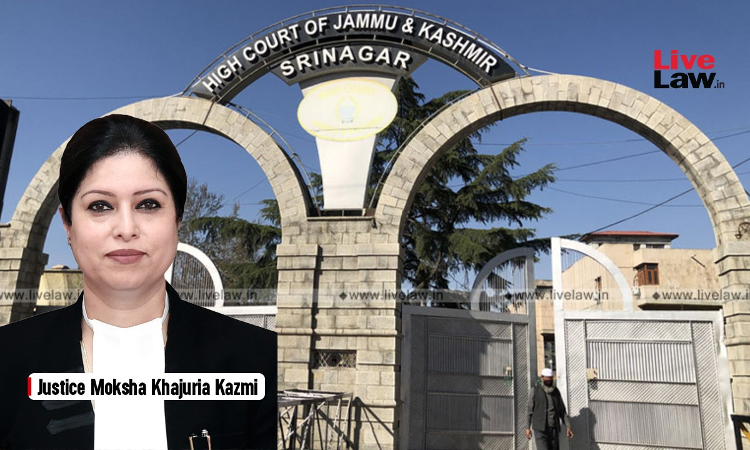- Home
- /
- High Courts
- /
- High Court of J & K and Ladakh
- /
- J&K High Court Directs FCI To...
J&K High Court Directs FCI To Refund Almost ₹8 Lakh To Transport Contractor, Says Retrospective Recovery Based On Revised Route Is Illegal
LIVELAW NEWS NETWORK
1 July 2025 7:00 PM IST
The High Court of Jammu and Kashmir and Ladakh on Monday directed the Food Corporation of India (FCI) to refund an amount of ₹7,93,456 to a transport contractor, M/s Durga Enterprises, after holding that recoveries made retrospectively based on revised route distances were illegal and contrary to contractual terms and policy guidelines.Underscoring the binding nature of contract terms,...
The High Court of Jammu and Kashmir and Ladakh on Monday directed the Food Corporation of India (FCI) to refund an amount of ₹7,93,456 to a transport contractor, M/s Durga Enterprises, after holding that recoveries made retrospectively based on revised route distances were illegal and contrary to contractual terms and policy guidelines.
Underscoring the binding nature of contract terms, the impermissibility of unilateral retrospective financial impositions, and the limits of administrative discretion in public procurement contracts, Justice Moksha Khajuria Kazmi emphasised that once a party accepts the contractual terms and derives benefit, it is estopped from later challenging them.
The petitioner, a transport contractor engaged by the FCI for ferrying food grains across various routes in Jammu and Kashmir, had approached the High Court challenging FCI's action of deducting ₹76,92,578 from its running bills and security deposits. The deductions were made on the basis of alleged remeasurement of distances for various routes, all contracts secured by the petitioner through competitive bidding between 2017 and 2018.
Arguing on behalf of the petitioner, Senior Advocate P.N. Raina submitted that the FCI had no authority to remeasure distances unilaterally during the currency of the contract, and even if it did, any deductions based on such revised distances could not be given retrospective effect.
FCI, on the other hand, defended the remeasurements as being in line with Clause XVIII(a)(v) of the Model Tender Form (MTF), which permits distance verification and revision by designated officers and renders such revised distances binding on contractors. It claimed that infrastructural developments such as realigned highways and new flyovers necessitated periodic reassessment of distances to safeguard public funds, especially since the contracts were on a “per MT/KM” basis.
Justice Kazmi, while accepting FCI's right to revise distances prospectively, drew a clear legal boundary on how and when such revised metrics can be applied. She observed,
“From a plain reading of Clause XVIII(a)(v) of the MTF, the consistent decisions of the GRC, and the authoritative circulars, it is clear that the FCI is legally entitled and contractually authorized to remeasure and revise road distances during the contract period. The remeasurement is not dehors the contract.”
The Court also took into account the conduct of the petitioner, who had previously accepted an initial downward revision in the Ramban route (from 170 km to 139 km) without protest, and then raised bills accordingly. Citing the Supreme Court's observations in Rajasthan State Industrial Development and Investment Corp. Ltd. v. Diamond & Gem Development Corp. Ltd. (2013) and Union of India v. N.K. (P) Ltd. (1972) the Court held,
“A party who has accepted the terms of a contract and received benefit therefrom is estopped from turning around to challenge the same. The conduct of the petitioner in accepting previous remeasurements operates as a waiver and legal estoppel.”
However, the Court found force in the petitioner's grievance that FCI had applied revised distances with retrospective effect i.e., from a date prior to the actual remeasurement which even the Grievance Redressal Committee (GRC) of FCI had found to be incorrect. The Court noted,
“The respondents, in their affidavit and counter submissions, have admitted that recoveries in certain cases were made from 01.04.2019, even though the remeasurement was carried out at later dates. The GRC in both its decisions has clearly held that revised distances should be applied only from the date of actual remeasurement, unless there is concrete evidence of earlier structural changes.”
In light of these admissions, the Court declared that the contractor was entitled to a refund for excess recoveries made prior to the actual date of remeasurement. Thus, the total amount of ₹7,93,456 was directed to be refunded to the petitioner.
Justice Kazmi further held,
“Since it is established and admitted by the respondent-FCI that an excess amount of ₹7,93,456 was recovered prior to the respective remeasurement dates, this Court deems it appropriate to dispose of the writ petition by directing the respondent-FCI to refund the amount within a period of six weeks from the date of this judgment. In case of failure, the amount shall carry interest at the rate of 6% per annum from the date of this judgment until actual payment.”
Notably, the Court also addressed the scope of judicial review in contractual matters, distinguishing the present case from earlier decisions such as M/s S. Surinder Singh v. FCI (decided by the same Court in 2018), where writ jurisdiction was declined due to the availability of alternative remedies.
Justice Kazmi emphasized that in this case, the FCI itself had conceded its mistake in part, and the challenge was not to the interpretation of terms alone, but to a clear breach of the respondents' own admitted policy.
Case Title: M/S Durga Enterprises Vs FCI & Ors
Citation: 2025 LiveLaw (JKL) 253



